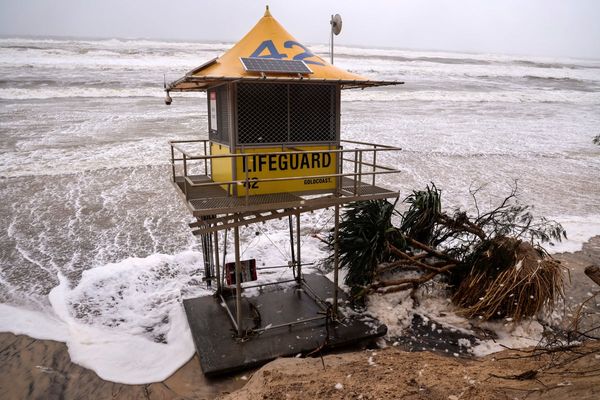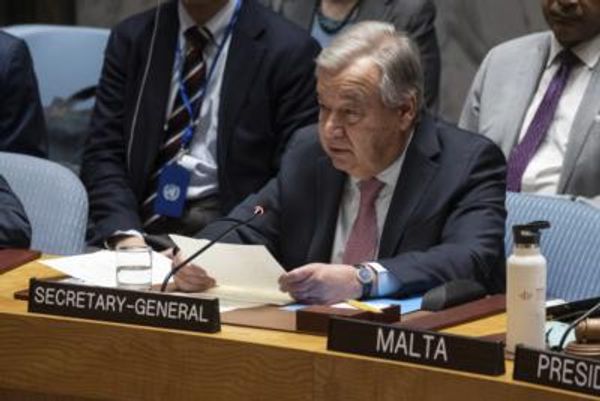
Global powers have called for restraint to avoid further escalation after Iran’s unprecedented missile and drone attack on Israel. The United Nations chief, António Guterres, told an emergency meeting of the UN security council on Sunday that the Middle East was “on the brink” and the could not afford more war. “The people of the region are confronting a real danger of a devastating full-scale conflict,” he said. “Now is the time to defuse and de-escalate.”
President Joe Biden warned Israel the US would not take part in a counteroffensive against Iran after Sunday’s attack involving about 300 missiles and drones, almost all of which were intercepted. A senior Biden administration official said Washington aimed to de-escalate regional tensions. “We do not want a broader regional conflict.”
Israel’s war cabinet is to convene again as the country continues to deliberate how to respond to Iran’s unprecedented missile and drone assault on its territory. The three-man war cabinet– the prime minister, Benjamin Netanyahu, his defence minister, Yoav Gallant, and Benny Gantz, a former defence minister and centrist Netanyahu rival, as well as several observers – will meet at 2pm local time (1200 BST) on Monday. It last convened late on Sunday, and signalled it will not immediately act alone against Tehran.
The US secretary of state, Antony Blinken, held separate calls with his Jordanian, Saudi Arabian, Egyptian and Turkish counterparts and reiterated the US did not seek escalation, according to the US state department, while emphasising the US would continue to support Israel’s defence.
The UK’s foreign secretary, David Cameron, has urged Israel to act with its head as well as its heart and not escalate the conflict by mounting a revenge raid on Iran. His remarks imply the UK would not take part in an attack on Iran but would continue to defend Israel if it came under further assault. Lord Cameron said: “We are saying Israel has a right to respond but we do not support a retaliatory strike.”
The G7 said its leaders unequivocally condemned Iran’s strikes, the Islamic Republic’s first ever direct attack on the Jewish state and made in retaliation for a suspected Israeli strike on the Iranian consulate in Damascus, the Syrian capital, on 1 April that killed seven members of the Revolutionary Guards including two generals. “We express our full solidarity and support to Israel and its people and reaffirm our commitment towards its security,” the G7 leaders said in a statement.
Global airlines faced disruptions to flights on Monday after Iran’s attack further narrowed options for planes navigating between Europe and Asia, causing chaos in the aviation industry. At least a dozen airlines had to cancel or reroute flights over the past two days, including Qantas, Lufthansa, United Airlines and Air India. It was the biggest single disruption to air travel since the attack on the World Trade Centre on 11 September 2001, according to Mark Zee, founder of OpsGroup, which monitors airspace and airports.
At the UN, Iran’s envoy, Amir Saeid Iravani, said the country was exercising its “inherent right to self-defence” and “had no choice” but to act. Tehran warned earlier that it would strike again with greater force if Israel or the US retaliated.
Israel’s UN envoy, Gilad Erdan, urged the council to “impose all possible sanctions on Iran before it’s too late” and to “condemn Iran for their terror”.
The deputy US ambassador at the UN, Robert Wood, said Washington would explore additional, unspecified measures at the body to hold Iran accountable and warned against further aggression.
Jordan’s prime minister said escalation in the region would lead to “dangerous paths”. Bisher Khasawneh told his cabinet: “The army will respond to anything that will jeopardise the security and safety of the kingdom and the sanctity of its airspace and territory … with all the available means.” Jordan also summoned the Iranian ambassador to protest against comments by Iranian official media warning that Jordan would be the next target if it cooperated with Israel in striking Iran.
Turkish, Jordanian and Iraqi officials said on Sunday that Iran gave wide notice days before its attack, but US officials said Tehran did not warn Washington and that it was aiming to cause significant damage. The attack caused only modest damage in Israel, including to the Nevatim airbase, but left a seven-year-old girl critically injured.
The Israeli military said it intercepted a drone that approached the country from the south-east on Sunday evening.
The US House of Representatives speaker said on Sunday he would try to pass aid to Israel this week after Iran’s attack. Mike Johnson, who is struggling to unify Republicans and avoid being ousted, recounted two failed attempts to pass standalone aid for Israel.










